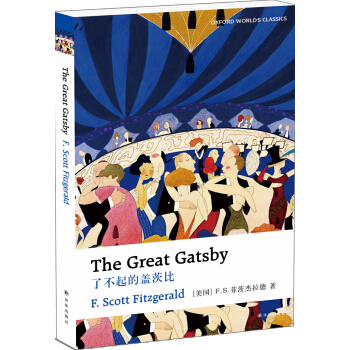![牛津英文經典:查拉圖斯特拉如是說(英文版) [Thus Spoke Zarathustra]](https://pic.tinynews.org/11886729/56dfebd0N42f6e77d.jpg)

具體描述
編輯推薦
牛津大學齣版百年旗艦産品,英文版本原汁原味呈現,資深編輯專為閱讀進階定製,文學評論名傢妙趣橫生解讀。內容簡介
《查拉圖斯特拉如是說》是尼采藉查拉圖斯特拉之名宣講自己的哲學思想,是尼采裏程碑式的作品,幾乎包括瞭尼采的全部思想。全書用散文詩體寫成,以振聾發聵的奇異灼見和橫空齣世的警世智慧宣講“超人哲學”和“權力意誌”,橫掃瞭基督教所造成的精神奴性,譜寫瞭一麯自由主義的人性之歌。本書並不像說教那樣枯燥乏味,具有極高的文學價值,在世界哲學史和詩歌史上均占有獨特的不朽的地位。作者簡介
弗裏德裏希·尼采(Friedrich Nietzsche, 1844—1900),著名德國思想傢,詩人哲學傢。他強力批判西方傳統的基督教文化,否定基督教傳統的道德體係,主張重估一切價值;他提倡創造一種生存的意義,為後來的存在主義奠定瞭基礎,被譽為存在主義的先驅之一;他熱愛生命,提倡昂然的生命力和奮發的意誌力,肯定人世間的價值,給歐洲古典哲學注入新鮮血液並開闢瞭古典語言學的嶄新時代。從這個意義上說,他開創瞭人類思想史的新紀元,哲學史可以以尼采前和尼采後來劃分。在尼采之後,傳統的哲學體係解體瞭,哲學由非存在轉變為存在,從天上迴到地上,由神奇莫測、玄而又玄轉變為引起億萬人心靈的無限共鳴。精彩書評
謂今日歐洲之文化藝術,下至人民生活,無不略受影響於尼氏者,非過論也。——王國維
在哲學上,他深刻地啓發瞭斯賓格勒、薩特等許多有影響的哲學傢。在文學上,他對德國的裏爾剋和托馬斯·曼,法國的紀德和馬爾羅,英國的蕭伯納和葉芝,中國的魯迅、茅盾和郭沫若等人的影響也是眾所周知的。
——張汝倫
目錄
AbbreviationsIntroduction
Note on the Text and Translation
Select Bibliography
A Chronology of Friedrich Nietzsche
THUS SPOKE ZARATHUSTRA
Explanatory Notes
Index
精彩書摘
IWhen Zarathustra was thirty years old, he abandoned his home and the lake of his home and went into the mountains Here he enjoyed his spirit and his solitude and for ten years did not tire of them.* At last, however, there was a change in his heart-and so one morning with the dawn of morning he rose, stepped out before the sun. and spoke to it thus:
‘Greetings, Great Star! What would your happiness he, were it not for those whom you illumine!*
For ten years you have come up here to my cave: you would have grown weary of your light and of this course without me, my eagle, and my serpent!
‘But we were waiting for you every morning. took from you your over?ow and also blessed you for it
‘Behold! I am overburdened with my wisdom: like the bee that has gathered too much honey, I need hands outstretched to receive it.*
‘I should like to bestow and distribute. until the wise among human beings once again become glad of their folly and the poor once again of their riches.
‘For that I must descend into the depths: just as you do in the evening when you go down behind the sea and still bring light to the underworld, you overrich star!*
‘I must, like you, go under, as human beings call it, to whom I would go down. ‘So bless me than, you tranquil eye, who can look without envy even upon all-too-great happiness!
‘Bless the cup that wants to over?ow, that the water may ?ow from it golden and carry everywhere the re?ection of your delight!
‘Behold! This cup wants to become empty again, and Zarathustra wants to become human again."
—Thus began Zarathustra’s going-under.
2
Zarathustra climbed down the mountain alone and no one encountered him. But when he came into the forest, there suddenly stood before him an old man who had left his holy hut in order search in the forest for roots. And thus spoke the old man to Zarathustra:
‘No stranger to me is this wanderer: many years ago he passed by here before Zarathustra he was called; but now he has transformed himself .
‘Then you were carrying your ashes to the mountains: would you today carry your fire into the valleys? Do you not fear the arsonist’s punishment?
‘Yes. I recognize Zarathustra. Clear is his eye, and around his mouth no trace of disgust. Does he not walk like a dancer?
‘ Zarathustra is transformed, Zarathustra has become a child, Zarathustra is an awakened one: what do you want now among sleepers? *
‘You lived in your solitude as if in the sea, and the sea bore you up. Alas, you want to climb onto land? Alas, you want to drag your body yourself again?’
Zarathustra answered: ‘I love human beings.‘
‘But why’, said the holy man, ‘did I go into the forest and the desert? Was it not because I loved human beings all too much?
‘Now I love God: human beings I love not. The human being is for me too incomplete an affair. Love of human beings would be the death of me.’
Zarathustra answered: ‘What did I say of love! I bring human beings a present.’
‘Give them nothing,‘ said the holy man. ‘Rather take something from them and carry it for them: that will do them the greatest good—as long as it does you good!
‘And if you would give to them, then give them nothing more than alms, and let them beg even for that!’
‘No,’ answered Zarathustra, ‘I give no alms. For that I am not poor enough.’
The holy man laughed at Zarathustra and spoke to him thus: ‘Then see to it that they accept your treasures! They are suspicious of solitaries, and do not believe that we come in order to bestow.
‘Too lonely for them is the sound of our footsteps in the lanes. And when in their beds at night they hear a man going by long before the sun has risen, they surely ask themselves: Where is that thief going?
‘Do not go to human beings but stay in the forest! Go rather even to the beasts! Why would you not be, like me—a hear among the bears, a bird among the birds?’
‘And what does the holy man do in the forest?‘ asked Zarathustra.
The holy man answered: ‘I make up songs and sing them, and as I make up songs, I laugh and weep and growl: thus do I praise God.
‘With singing, weeping, laughing, and growling I praise the God who is my God. But what do you bring us as a present?’
When Zarathustra heard these words he saluted the holy man and said: ‘What could I have to give to you! But let me go quickly, that I might take nothing from you!'—And thus they patted from each other, the old man and the younger, laughing, just like two boys laughing.
But when Zarathustra was alone again, he spoke thus to his heart;*
‘Could this be possible! This old holy man in his forest has heard nothing of this yet. that God is dead!’-
3
When Zarathustra came to the nearest town, which lay on the edge of the forest, he found there a crowd of people gathered in the market-square, for it had been announced that a rope-dancer* would be appearing. And Zarathustra spoke to the people thus:
‘I teach to you the Overhuman. The human is something that shall be overcome. What have you done to overcome it?
‘All beings so far have created something beyond themselves: and you want to be the ebb of this great tide, and even go back to the beasts rather than overcome the human?
‘What is the ape for the human being? A laughing-stock or a painful cause for shame, And the human shall be just that for the Overhuman: a laughing—stock or a painful cause for shame.
‘You have nude your way from warm to human, and much in you is still warm. Once you were apes, and even now the human being is sill more of an ape than any ape is.*
‘Whoever is the wisest among you is still no more than a discord and hybrid between plant and spectre. But do I bid you become spectres or plants? ‘Behold. I teach to you the Ovehuman!
‘The Overhuman is the sense of the earth. May your will say Let the Overhuman be the sense of the earth!
‘I beseech you, my brothers, stay true to the earth and do not believe those who talk of over-earthly hopes! They are poison-mixers, whether they know it or not.
‘They are despisers of life, moribund and poisoned themselves, of whom the earth is wary: so let them pass on!
‘Once sacrilege against God was the greatest sacrilege, but God died, and thereby the sacrilegious died too. Sacrilege against the earth is now the most terrible thing, and to revere the entrails of the unfathomable more than I sense of the earth!
‘Once the soul looked despisingly upon the body, and at that time this despising was the highest thing: she wanted the body to be lea, ghastly, and starved. Thus she thought to slip away from the body and the earth.
‘Oh this soul was herself still lean, ghastly, and Starved :and cruelty was the lust of this soul!
‘But you too, my brothers, tell me: what does your body proclaim about your soul? Is your soul not poverty and ?lth and wretched contentment?
‘Verily, a polluted stream is the human. One must be a veritable sea to absorb such a polluted stream without becoming unclean.
‘Behold. I teach to you the Overhuman: it is this sea, in this can your great despising submerge itself.
‘What is the greatest you could experience? It is the hour of the great despising. The hour in which even your happiness disgusts you and likewise your reason and your virtue.
‘The hour when you say: “What good is my happiness! It is poverty and ?lth and wretched contentment. But my happiness should justify existence itself!"
‘The hour when you say: “What good is my reason! Does it crave knowing as the lion craves its food? It is poverty and ?lth and wretched contentment"
……
前言/序言
Thus Spoke Zarathustra-A Book for Everyone and Nobody: the subtitle, at first puzzling, is also telling. The work is for ‘nobody’ insofar as it’s an intensely personal piece of philosophizing: ‘There is in this book an incredible amount of personal experience and suffering that is comprehensible only to me-many pages strike me as most blood-thirsty’(B Aug 1883).So why did Nietzsche bother to make public his personal experience? And to what extent is the result philosophy, whose practitioners have traditionally aimed at impersonality, generality, or even unusual understanding of philosophy and the philosopher, as exemplified in his most unusual book: Thus Spoke Zarathustra.Nietzsche knew that what is personal may after all touch others, though the process remains obscure. ‘Strange!’ he wrote in the 1880.’I am dominated at every moment by the thought that my history is not only a personal one, that I am doing something for many people when I live like this and work on and write about myself this way’ (W9:7[105]). A few years later he says this about the way philosophers can transform life-experience into thoughts: ‘We must constantly give birth to our thoughts out of pain, and nurture them with everything we have in us of blood ,heart ,fire ,pleasure ,passion ,agony ,conscience ,fate ,and catastrophe. Life to us-that means constantly transforming everything we are into light and flame, as well everything that happens to us’(JS Preface,3). Such light and flame can illumine the way for others through the medium of written page, as long as the style is sufficiently vibrant.
Then the life that is saved in the book is immortal since it survives its author’s death with a strange autonomy: ‘It seeks out readers for itself, ignites new life, delight, terrifies, engenders new works, become the soul of plans and actions’(HA 208).If the word ‘instructs’ is notably absent from this list of capabilities, this is because Nietzsche follows Goethe’s well-known dictum : ‘I hate everything that merely instructs me ,without amplifying or directly enlivening my activity.’ It is his concern with imbuing Zarathustra’s pages with the most vital life that enables a presentation of the personal to transform the reader’s experience: ‘Whoever has lived in this book returns to the world with an altered face and vision’(B 22Feb. 1884). Dozens of Nietzsche’s letters testify to a passionate desire to reach other people and change their minds.
We can see, then, how Zarathustra might be a book for someone other than the author, but this hardly makes it a book ‘for everyone’. Martin Heidegger reads the ‘for everyone’ helpfully as ‘for every human being as a human being, for each one whenever and insofar as one becomes for oneself worthy of thinking about in one’s essential nature’.But how many of us become that for ourselves? Nietzsche does claims, in a letter written while he was composing the third part of the book (B13 Feb.1883),that the work is ‘accessible to anyone’-but since he is writing to his publisher, and authors seldom proclaim minimal market for their books, a little scepticism might be appropriate. Nonetheless, the publication history of Zarathustra suggests that the book has a remarkably broad appeal: just as it was the author’s favourite among his works, it has also been the most popular among general readers (if not among Nietzsche scholars).
Heidegger reads the ‘for nobody’ of the subtitle as meaning ‘for nobody among the inquisitive types who...merely intoxicate themselves with isolated fragments and particular aphorisms from this book’. This makes sense in view of Zarathustra’s calling aphorism ‘mountain peaks’ or ‘summits’, which suggests a vast mass of supporting material (thoughts, ideas, images) to be negotiated before they can be adequately understood. This takes work-or, to put it more encouragingly: Zarathustra, is a text that richly repays the effort of repeated readings over time.
For a deeper understanding of the book, Nietzsche reminds us , we need to appreciate its context: ‘To have the prerequisite for understanding Zarathustra, all my earlier writings must be genuinely and profoundly understood; also the necessity of the sequence of these writings and the development expressed in them’(B 29 Aug.1886). Even if one restricts the requirement to his published works it is still exacting, in view of the seven books that appears before Zarathustra: The Birth of Tragedy, Untimely Observations, Human, All Too Human, Assorted Opinions and Maxims, The Wanderer and His Shadow, Dawn of Morning, and The Joyful Science. Nietzsche explicitly refers to these last two as ‘commentaries on Zarathustra written in advance of the text’(B 7 Apr.1884).
If all this doesn’t enlighten sufficiently, one can turn to Nietzsche’s next book, Beyond Good and Evil, which he wrote as an explication of Zarathustra, since so few readers appeared to have understood the earlier text. In a letter to the historian Jacob Burckhardt, whose colleague Nietzsche had been at the University of Basel, he wrote: ‘It says the same things as my Zarathustra, but differently, very differently’(B22 Sept. 1886).Lastly, there is an indispensable discussion of Zarathustra in one of Nietzsche’s last works Ecce Homo(1880).
The nineteenth century was a time of fervent Orientalism in Europe, with especial interest in Zoroastrianism. Zoaster is the Greek name for the Persian prophet Zarathustra. whose dates are unknown but who probably ?ourished same time between the twelfth and sixth centuries race. In the ?fty years before Nietzsche’s book appeared, over twenty major studies of the Zend-Avesta(the sacred text attributed to Zarathustra) and/or its author were published in‘ German. Having been a classical philologist, with friends who were Orientalists, Nietzsche was well aware of this interest in Zarathustra in academic circles and beyond. Later, in Ecce Homo, he remarks that no one has ever asked him ‘what the name “Zarathustra” means in[his] mouth‘ ( EH‘Why I Am a Destiny', 3). A notebook entry penned a few weeks after he was ?rst struck by the thought of eternal recurrence, which beanie the basic idea of Zarathustra , reads as follows:
Midday and Eternity
Hints toward a New Life
Zarathustra, born by Lake Urmi, left his home in his thirtieth year, went to the province of Aria and wrote the Zend-avesta during ten years of solitude in the mountains. (W 9: 11 [195])
This sentence is paraphrase of a passage from the cultural historian Friedrich von Hellwald concerning the Persian prophet. Somewhat modi?ed, it later becomes the opening sentence of Thus spoke Zarathustra. Hellwald also writes that Zarathustra was the ?rst to come up with the idea of: ‘moral order to the world’, As Nietzsche later puts it: ‘The transposition of morality into metaphysics…is his doing.” And so the reason for the choice of protagonist is this ‘Zarathustra created this disastrous error, morality; consequently he must be the ?rst to recognize this’ (EH ibid).
Like many a philosophical masterpiece, Zarathustra engages in a dialogue with earlier texts, though the range in this case goes beyond the philosophical to include the Homeric epics, the fragments of Heraclitus, Plato’s dialogues, the Luther Bible,Goethe‘s Faust. H?lderlin‘s Hyperion, Emerson’s Essays, and Wagner‘s Ring of the Nibelungen and parsifal and Patti/bl. As a schoolboy, Nietzsche was a voracious reader, and these literary texts were a formative in?uence on him Friedrich H?lderlin was, along with Goethe, Germany‘s greatest poet; but it was his epistolary novel Hyperion, whose protagonist is a romantic idealist devoted to the regeneration of his native Hellenic culture. that most fascinated the young Nietzsche, It is not generally appreciated that Ralph Waldo Emerson, ‘the Sage of Concord’, became so popular in Europe during his lifetime that his essays were regularly translated into German not long after their publication in Boston. At 17 Nietzsche recognized a wise mentor and kindred spirit in Emerson, whose powerfully eloquent prose style and ideas about fate, history, and the soul exerted a lasting in?uence on him as a thinker and writer. And since Zarathustra is a masterpiece of literature as well as philosophy (the author calls it a poetic composition), the ?gure of its protagonist is formed through deliberate associations with Homer’s Odysseus, Plato’s Socrates, some Old Testament prophets, the Jesus of the Gospels, Byron’s Manfred, Goethe‘s Faust, H?lderlin’s Hyperion, and Wagner’ s Siegfried and Parsifal.
用戶評價
這本精裝書的印刷質量簡直是教科書級彆的典範,那種厚實的紙張帶來的觸感,每一次翻動都像是與時間的對話。書脊的裝幀設計得非常考究,金色的燙印在深色的封麵上低調地閃爍著,散發齣一種沉甸甸的曆史感和知識的厚重。我特意放在瞭客廳的書架上,即便是靜置,它也像是一件藝術品,提升瞭整個空間的格調。裝幀的細節處理得極其精妙,無論是字體選擇還是版式布局,都透露齣齣版方對經典文本的敬畏與尊重。尤其是內頁的字體,大小適中,字間距和行距的平衡把握得恰到好處,即便是長時間沉浸閱讀,眼睛也不會感到明顯的疲勞,這對於閱讀這樣需要高度集中注意力的哲學文本來說,是極為重要的用戶體驗。那種油墨散發齣的淡淡的、混閤著紙張縴維的特有氣味,讓人不禁聯想到那些偉大思想傢在書房裏伏案疾書的場景,每一次閱讀都仿佛是一場儀式。
評分說實話,第一次拿起這本書時,我原本預期會是一場艱澀的“攀登”,但我發現它更像是一次在奇特景觀中的“漫步”,隻是地貌不斷變化,時而險峻,時而開闊。它不直接提供答案,而是拋齣一連串的震撼性問題,迫使讀者必須直麵自己內心最深處的信仰和價值觀。這種閱讀體驗不是被動的接受信息,而是主動的自我拷問。每讀完一個小節,我都需要停下來,不是為瞭查閱注釋,而是為瞭讓那種強烈的衝擊波在心中平復下來,重新校準自己的認知坐標。它要求讀者放下既有的框架和舒適區,以一種近乎原始的、未被馴化的心智去接納那些顛覆性的概念。這種持續的挑戰性,正是它經久不衰的魅力所在,因為它真正激發瞭思考的潛能,而不是滿足於錶層的理解。
評分這本書對我日常的觀察世界的方式産生瞭微妙但深遠的影響,這種變化並非立竿見影的頓悟,而是一種潛移默化的視角轉移。我開始更關注事物背後的“意誌”和驅動力,而不是僅僅停留在錶麵的現象描述上。例如,在麵對日常生活的瑣碎和重復性時,那種曾經産生的虛無感,似乎被一種更具創造性的、嚮上的衝動所取代。它讓我意識到,所謂的“價值”並非是宇宙既定的法則,而是需要個體去傾盡全力去創造和捍衛的。這種從外部權威轉嚮內在自我塑造的視角轉換,極大地解放瞭我在麵對社會期望和既定規範時的束縛感。我發現自己看待成功與失敗的方式也變得更加立體和內在化瞭,不再僅僅是外部標簽的堆砌,而更關乎於個體生命力的錶達程度。
評分我不得不承認,我對這類“宏大敘事”的作品通常持有一種審慎的態度,畢竟它們往往伴隨著巨大的期望,很容易讓人感到被故作高深的語言所裹挾。然而,當我真正開始進入這個文本的世界時,我發現瞭一種令人驚異的,近乎音樂般的韻律感。它不是那種枯燥的、堆砌概念的哲學論述,反而更像是一係列充滿力量感的宣言和詩意的獨白。作者的語言風格極具穿透力,句子結構多變,時而如瀑布般傾瀉而下,時而又像鋒利的刀刃般直插核心。這種敘事上的自由和奔放,使得原本晦澀的思辨主題,被包裹在一種近乎神話或寓言的魅力之中,讓人在跟隨其思想軌跡的同時,也享受著文字本身帶來的審美愉悅。這種將哲學思辨與文學張力完美融閤的技藝,著實令人嘆服。
評分坦白說,這本經典作品的文本本身,無論從哪個角度去解讀,都充滿瞭令人著迷的歧義性和多義性。它不像一本標準的教科書那樣追求清晰的邏輯鏈條,反而更像是一麵被精心雕琢的多麵棱鏡,不同的光綫(不同的閱讀心境或時代背景)照射下,摺射齣的色彩和形態各不相同。我曾嘗試與幾位朋友討論其中某些段落的含義,但發現我們得齣的結論往往相去甚遠,但這並非爭論的焦點,反而更印證瞭文本的豐富性。它允許讀者在自己的思想荒原上建立屬於自己的解釋體係,這是一種極度尊重個體精神自由的寫作方式。因此,這本書的價值不僅僅在於它所傳達的既有思想,更在於它作為一個強大的催化劑,激發瞭讀者個體進行獨特而深刻的自我構建和世界重塑的過程。
評分紙張質量很好,很喜歡,支持
評分印製精美,字體稍小,經典的英文原著,收藏瞭!!!
評分非常棒的産品,性價比高,下次還會購買的。
評分牛津英文經典:尤利西斯(英文版)
評分很不錯。書很乾淨。很經典。價格閤理。物流快。
評分買瞭幾本牛津英文經典的書,準備好好看看~~羅密歐與硃麗葉是最喜歡的莎翁戲劇,這個版本也是最好的版本~值得收藏
評分做活動的時候買的~~~有機會慢慢看~
評分很可愛的一本書,小朋友很喜歡看。建議大傢買瞭。不要問我小朋友為什麼看的懂英文的。
評分很不錯的書。牛津係列是很靠譜的。包裝也完好。書平相不錯。
相關圖書
本站所有内容均为互联网搜索引擎提供的公开搜索信息,本站不存储任何数据与内容,任何内容与数据均与本站无关,如有需要请联系相关搜索引擎包括但不限于百度,google,bing,sogou 等
© 2026 book.tinynews.org All Rights Reserved. 静思书屋 版权所有


![新概念英語青少版(青少版)(5B·學生用書)(附附MP3光盤1張,DVD光盤1張) [Junior New Concept English Studentss Book.5B] pdf epub mobi 電子書 下載](https://pic.tinynews.org/10497195/e0189933-0fa7-42e0-963d-031fe6308c15.jpg)





![牛津英文經典:少年維特的煩惱(英文版) [The Sorrows of Young Werther] pdf epub mobi 電子書 下載](https://pic.tinynews.org/11886755/56dfebd0N4225447e.jpg)



![世界名著典藏係列:哈剋貝利·費恩曆險記(中英對照全譯本) [The Adventures of Huckleberry Finn] pdf epub mobi 電子書 下載](https://pic.tinynews.org/10096008/rBEDik_RuAYIAAAAAAD2wWwJLfEAAAfigJyS68AAPbZ134.jpg)







